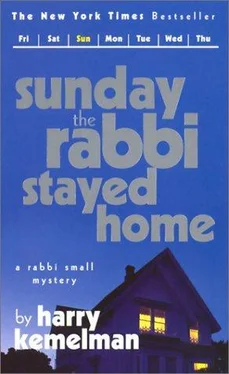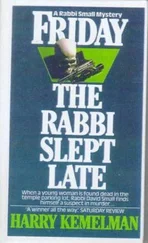Harry Kemelman - Sunday the Rabbi Stayed Home
Здесь есть возможность читать онлайн «Harry Kemelman - Sunday the Rabbi Stayed Home» весь текст электронной книги совершенно бесплатно (целиком полную версию без сокращений). В некоторых случаях можно слушать аудио, скачать через торрент в формате fb2 и присутствует краткое содержание. Город: New York, Год выпуска: 2002, ISBN: 2002, Издательство: iBooks, Жанр: Иронический детектив, на английском языке. Описание произведения, (предисловие) а так же отзывы посетителей доступны на портале библиотеки ЛибКат.
- Название:Sunday the Rabbi Stayed Home
- Автор:
- Издательство:iBooks
- Жанр:
- Год:2002
- Город:New York
- ISBN:978-0743452380
- Рейтинг книги:3 / 5. Голосов: 1
-
Избранное:Добавить в избранное
- Отзывы:
-
Ваша оценка:
- 60
- 1
- 2
- 3
- 4
- 5
Sunday the Rabbi Stayed Home: краткое содержание, описание и аннотация
Предлагаем к чтению аннотацию, описание, краткое содержание или предисловие (зависит от того, что написал сам автор книги «Sunday the Rabbi Stayed Home»). Если вы не нашли необходимую информацию о книге — напишите в комментариях, мы постараемся отыскать её.
Sunday the Rabbi Stayed Home — читать онлайн бесплатно полную книгу (весь текст) целиком
Ниже представлен текст книги, разбитый по страницам. Система сохранения места последней прочитанной страницы, позволяет с удобством читать онлайн бесплатно книгу «Sunday the Rabbi Stayed Home», без необходимости каждый раз заново искать на чём Вы остановились. Поставьте закладку, и сможете в любой момент перейти на страницу, на которой закончили чтение.
Интервал:
Закладка:
“Naturally. I think you would.” said the rabbi.
“Yeah? Then how come all the stores down in our neighborhood that were profiteering on us were owned by Jews?”
“Now. Lucius—” Professor Richardson was distressed.
A spot of color appeared in the rabbi’s normally pale cheek. He said quietly. “I know only one Jewish merchant who had a store in the Negro area in the town where I grew up. His father had started it long before your people moved to the neighborhood. He was certainly not a rich man. He couldn’t sell the store, and he never had the money to close up and start another in a different location. Finally the decision was made for him when there was a riot in the area. They broke his windows and cleaned out his shelves for him.”
The Negro was not abashed; on the contrary, he glared at the rabbi, and when he spoke, it was once again in his normal cultured baritone, and his tone was accusing. “And am I supposed to feel shocked because my people finally kicked over the traces and got a little of their own back? For four hundred years you have oppressed us and brutalized us and enslaved us, robbed us of our heritage and our manhood—”
The rabbi rose, and Miriam, too, got up. “We really have to go, Mrs. Richardson.” He turned to the Negro poet. “Those four hundred years you speak of, Mr. Rathbone, my people lived in the ghettos of Europe—Poland, Russia, Germany—and there were no Negroes there. My grandfather, who came to this country from a small town in Russia at the turn of the century, like the rest of my ancestors, had never even seen a Negro, much less enslaved and brutalized and robbed him of his manhood.” Miriam had come over to stand beside her husband, and he took her arm. Now he stared directly into the angry eyes of the handsome, light-skinned Negro. “Can you say the same of your ancestors. Mr. Rathbone?”
Chapter Eleven
You whipsawed me.” said Irving Kallen ruefully. “You and the Doc between you.”
Meyer Paff grinned. “Nothing to it, Irving,” he said. “It was the last hand, so we were just trying to make a pot.”
“Don’t you believe him. Irving.” said Dr. Edelstein. He was a round man with a perpetual smile (“A natural bedside manner.” his patients would say). “Normal tactics—drive out the buttonhole makers.”
“You ended up ahead, didn’t you?” demanded Paff.
Kallen evened off the little columns of chips in front of him. “Nope. Let’s see. I’m down thirty-two, no, thirty-seven cents. You’re the big winner tonight—as usual.”
Paff gathered in the chips to put away in the box. “Luck,” said Kallen.
“Don’t you believe it, Irv. You’ve got to know how to play,” said Paff.
“Maybe you’re right. Meyer. My game is bridge.”
“If you got card sense.” Kermit Arons offered, “you can play any card game.”
“Well, last night, I was playing bridge over at Nelson Shaffer’s house—”
“That explains it.” said Paff with finality. “You go playing cards on the Sabbath instead of going to the temple, and the next time you play, you’re going to lose.”
“Well, for thirty-two, no, thirty-seven cents, I figure I wasn’t punished too bad. Taking the two nights together. I’m still wa-ay ahead of the game. And from what I heard,” he added maliciously, “I’ll bet you wish you hadn’t gone last night.”
Paff shrugged his shoulders.
“What Brennerman pulled on Meyer was pretty raw,” said Arons, “but actually it was directed against all of us here.”
“You mean the business of the seating?” asked Dr. Edelstein. “As far as I’m concerned. I’d just as soon sit in the back row. With the public address system, you can hear just as good, and to tell the truth I kind of like the idea of being near the door so I can go out for a breather every now and then without everybody noticing.”
“How about if you find yourself downstairs in the vestry?”
“What do you mean?”
“Last year we had to have two services, one in the vestry. Right?”
“Yes, but the new members were assigned seats downstairs; the old members—”
“Sure, but the whole idea now is to make the seating democratic. If there are no reserved seats, it means that if you come in a little late, you go down to the vestry because all the seats in the sanctuary are full.”
“I don’t think I’d care for that.”
“Well” said Kallen, “I don’t like to sit in the back. What’s more, my old man considers our seats in the first row a kind of honor.”
“And how about the money we paid for those seats?” demanded Arons. “I plunked down a thousand bucks to the Building Fund—not a pledge, but hard cash—back when Becker was president. And it was supposed to reserve my seat for me each year, the same seat, mind you, until the last day of the ticket selling. Well now, I regard that as a contract that I entered into with the temple, and if anybody should live up to their contract, it seems to me it should be an organization like a temple.”
“You’re one hundred percent right, Kerm,” said Kallen. “That’s how I feel. If you can’t trust the word of a temple, who can you trust?”
“All right, what can you do about it?”
“I’ll tell you what I can do about it, Meyer,” said Kallen, his tone determined. “I’m still a member of the board of directors. I could place it before the board and demand that they take action.”
“So what would that get you? They’d take action, all right. They’d put it to a vote, and they’d vote Gorfinkle’s way. Remember, they’ve got a clear majority.”
“Well, if the board should repudiate their solemn promises, I’d pick up my marbles and get out.”
“And where would you go. Irv? To Lynn? To Salem? Where nobody knows you?”
“I’ll tell you what I would do.” Edelstein asserted. “I’d stay, but they’d whistle before they got a dime out of me.”
Paff shook his head. “It wouldn’t work, Doc. It might work in a church, but not in a temple. Our people don’t ask for it; they demand it. It’s part of the tradition. You know the old joke: The only thing two Jews can agree on is what a third should contribute to the support of the temple. No. if you were to give less than you gave last year, at the best everybody would think you had a bad year, that your practice was off. As for not giving at all—forget it. They just wouldn’t let you get away with it; they’d bother you and pester you until you came across.”
“Meyer’s right.” said Arons. “And you know what it means? It means that from here on in, we’ll be putting up the big money, we and our friends, and Gorfinkle and his gang will be spending it. They won’t even do us the courtesy of consulting us about it.”
“That’s right.” said Paff. “You don’t think this new seating plan was brought up before the board, do you?”
“You mean it was just Ted Brennerman’s idea? Dammit, they can’t do that. A change like that has to be brought up before the board.” said Kallen.
Paff shrugged his shoulders. “Oh, they’ll bring it up at the meeting, just to make it legal, and they’ll let us talk on it for a while, and then one of them will move the previous question and—zip—it’ll go through like that.” He snapped his fingers. “And that’s how it’s going to be from here on in. Make up your mind to it.”
“And that’s how they’ll work this Social Action Fund. They’ll appropriate all kinds of money, and they’ll disburse it any way they want to. We’ll give it, and they’ll spend it.”
“Aw, come on.” said Kallen. “How much of a fund will they set up? Five hundred? A grand? So what? I remember my old man told me that years ago, in all the shuts, they had a fund that the president used to control and to disburse when, say, some poor guy would come to town and didn’t have a place to sleep or needed a meal—”
Читать дальшеИнтервал:
Закладка:
Похожие книги на «Sunday the Rabbi Stayed Home»
Представляем Вашему вниманию похожие книги на «Sunday the Rabbi Stayed Home» списком для выбора. Мы отобрали схожую по названию и смыслу литературу в надежде предоставить читателям больше вариантов отыскать новые, интересные, ещё непрочитанные произведения.
Обсуждение, отзывы о книге «Sunday the Rabbi Stayed Home» и просто собственные мнения читателей. Оставьте ваши комментарии, напишите, что Вы думаете о произведении, его смысле или главных героях. Укажите что конкретно понравилось, а что нет, и почему Вы так считаете.












